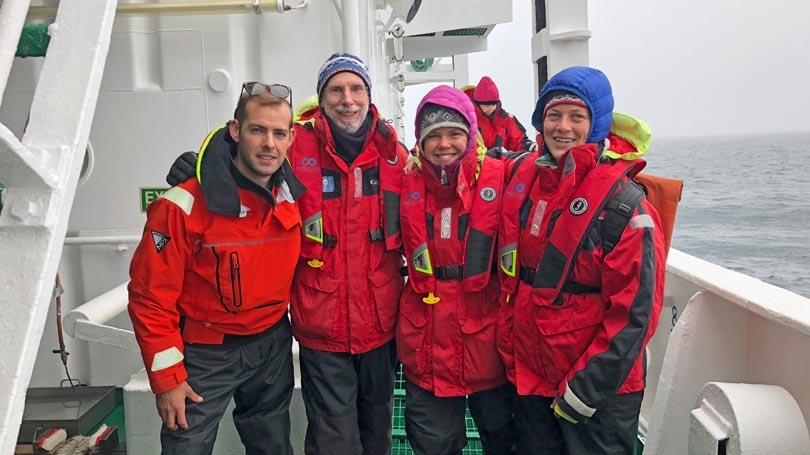As Hunter Snyder disembarked from the Russian research vessel Akademik Sergey Vavlilov in Sisimiut, Greenland, last summer as a student ambassador on a Dartmouth alumni trip, he was pleasantly surprised to find that the group’s local tour guide was one of his old friends from Nuuk. Uniquely memorable moments like this occurred throughout the three weeks Snyder spent traveling along the west Greenland coast with the alumni group in summer, including watching from the starboard deck in swell as expedition staff deftly maneuvered their Zodiac boats to connect the ship’s gangway to the dock at Qeqertarsuaq, or enjoying a world-class lunch of Greenlandic delicacies such as whale skin and musk ox on a warm, sunny day at Restaurant Røklubbenin Kangerlussuaq.
Snyder, a PhD student in the Ecology, Evolution, Ecosystems and Society Program at Dartmouth, is both a fisheries scientist and a political scientist. He researches governance challenges in Greenland’s fisheries, aiming to improve the study—and capability—of small-scale fishing. He has been working in Greenland since 2014 and also has experience as a cultural specialist and guide on National Geographic Lindblad Expeditions in the Arctic. These qualifications led his mentor, Ross Virginia, to invite Snyder in 2017 to join a small group of students accompanying the alumni expedition Virginia was organizing for the following year. Two undergraduate students also accompanied the group: Reyn Hutten ’21—who was recently featured in a multimedia profile of Dartmouth’s cutting-edge work in the Arctic—and Francesca Governali ’18.
Ross Virginia, Myers Professor of Environmental Studies, is a central figure in polar research and with many colleagues across the College has helped position Dartmouth as a leading research institution in the Arctic and Antarctic. In addition to leading alumni trips to high-latitude destinations such as Baffin Island and the coast of Greenland, Virginia has a large hand in steering polar science and policy: he served as a co-principal investigator on the National Science Foundation Long Term Ecological Research program located in the Dry Valleys of Antarctica, co-directs the U.S. Fulbright Arctic Initiative, is a Global Fellow in the Polar Institute of the Woodrow Wilson Center, and directs the Institute of Arctic Studies within the Dickey Center for International Studies at Dartmouth.
“Working with talented, motivated students like Hunter is the best part of my job. His work is focused on issues of importance to Greenlandic society and done in partnership with Greenland researchers. This approach comes from Dartmouth’s long and close relationship with Greenland institutions built around student exchanges, joint field education of high school students from the US, Greenland, and Denmark, and a diverse set of faculty and student research projects to understand climate change and its impacts on Arctic peoples and their environment. The opportunities for Arctic Studies in the Call to Lead Campaign as one of Dartmouth’s Big Bets on Discovery will ensure last excellence and international recognition of our strengths in this field,” Virginia said.
All the localities the alumni group visited were sites where Snyder conducts fisheries research. One example is the town of Ilulissat, a UNESCO World Heritage Site where massive icebergs calve from the ice sheets into Disko Bay—which itself is a key area for studying fisheries regulation. On the visit to Sisimiut, Snyder was able to introduce the alumni group to some of his local friends. At almost every stop, he “was able to travel down to a market to meet with fishers and fish workers, to read the bulletin boards for fishing news, and usually buy some dried fish or meat to bring aboard for others to sample,” Snyder recalls. At the end of the voyage, still above the Arctic Circle at 66°N latitude at Kangerlussuaq, the alumni departed for warmer climes while Snyder and Virginia were off to convene with the Joint Science Education Program (JSEP), which introduces Greenlandic, Danish, and American high school students to Arctic science. Virginia co-leads the program professors Culler, Ayres, and Albert, which sponsors Fellowships held by PhD students such as Snyder.
Snyder remembers that “our cohort of travelers from Dartmouth made for excellent company.” The feeling was mutual; alumni travelers reflected that “all three [Dartmouth students] conducted themselves with grace, poise and on top of that they were fun! They were incredible ambassadors for Dartmouth.” This set Dartmouth apart from peer institutions who sponsored alumni travelers on the voyage, as Dartmouth is the only school to send current students to accompany the group. Dartmouth Alumni Travel, which organized this trip from Baffin Island and down the west coast of Greenland, is sponsoring a similar voyage to Antarctica in 2020 led by Virginia. If you are visiting a polar region, Snyder recommends that you remember to pack rubber boots and notebook!
